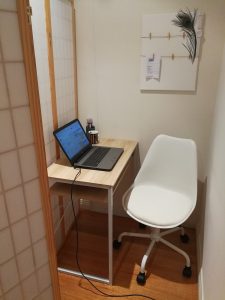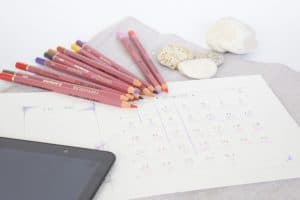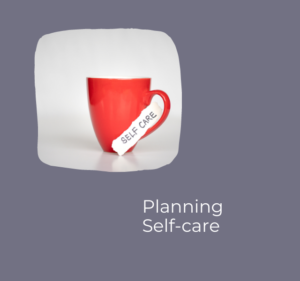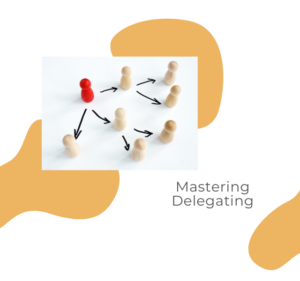Let’s get student bedrooms organised!
Today’s blog is a transcript (or sorts) of a workshop delivered to the Banyule City Council, Victoria. This workshop focused on how students can transform their bedroom into a space that’s organised. Making it ready for all parts of their life.
Looking at the Bedroom
Have a think about how many things you need your bedroom to do for you?
- Sleeping
- Study
- Dressing and getting ready
- Hanging out
- Energy/quiet time
It’s a lot for one room, right? Fair to say that it’s your HQ. This is where you do everything you need to do to be you.
So let’s look at organising that space so that it supports you.
Regardless of what you see on Instagram etc. organising is not about how the space looks, but about how it functions.
When organising, you’re discovering what makes a space inviting and functional for YOU!
Everybody will function in a different way.

First up – how many things we need our room to be is now going to form the basis of our zone guide.
Zones divide a room into activities. By keeping that activity limited to one area it defines and gives that area an energy. It gives it an intention that helps you to concentrate.
It makes things super easy because everything you need related to that topic is in arm’s reach. It’s easy to put back in place – helping you to keep organised.
Let’s have a tour of an average bedroom
- Sleeping – what’s kept in this zone? Bed, bedside table, lamp, sheets and blankets, pillows, book, eye mask? Ear plugs?
Try and keep your bed just for sleeping. No studying, no watching TV etc where you actually sleep. The brain really likes routine, so too many things in one spot confuses it, making it hard to switch gears.
BUT if you don’t have the luxury of a lounge chair for TV watching or your room is tiny here’s a trick! For a double bed, use ONE side of it for hanging out and the other for sleeping. Same idea for a single bed, use one end for hanging out and the other for sleeping.
Do you make your bed? If so, good job! It has so many benefits for your brain as well as your space.
1) Sense of accomplishment
2) Increased productivity
3) Reduces stress
4) Room looks cleaner and feels cleaner
- Hanging out – magazines, books, tablet, TV
- Energy/quiet time
- Dressing and getting ready – what’s kept in this zone? Dresser, wardrobe, clothes, shoes, hair and makeup
Clothing
Life can get pretty stressful sometimes. If you’re worrying about an upcoming exam or assignment, then having nothing to wear is just not fun.
 If you have too much stuff then taking the time to go through your things and declutter so you only have things that you love will really help. Why not shop your own wardrobe? Or feel guided when you dress in the morning.
If you have too much stuff then taking the time to go through your things and declutter so you only have things that you love will really help. Why not shop your own wardrobe? Or feel guided when you dress in the morning.
Also it may feel tempting to leave your laundry out but putting it away – completing the cycle – helps your energy as well as your focus.
Who’s heard of mindfulness? We’ll get more into it later on but chores are a great way of practicing mindfulness and killing two birds with one stone. Getting something done and taking a moment out for your brain to focus on something else. Feel the fabrics and really get interested in it all.
Study – what’s kept in this zone? Desk, chair, textbooks, stationery
Who has space in their room to study?
Anyone out on the dining table? Well, zoning works for you too. Rather than a desk, use a basket or unpack and pack up your backpack to signal to your brain that study is happening.
What’s essential with your work space is that you assign everything a home and you pop it back at the end of a session.
Categorise your subjects, if you’re working on one subject – put everything else to the side (in an in tray or use the ground).
Be creative with furniture (this goes back to your bed too, ask for help to move things around if they aren’t making you feel good).
Making a small space work: this was my first home office, I’d pull out the room divider and ta da! Work space. I’d then push everything back when not in use to switch off.  If your space is smaller or you don’t have access to room dividers etc simply throwing a scarf or a nice blanket over your desk can help you switch off.
If your space is smaller or you don’t have access to room dividers etc simply throwing a scarf or a nice blanket over your desk can help you switch off.
Also, hot tip – make a spot for your ‘out and about things’ – handbag or wallet, keys, myki, favourite lipgloss, this can be a 3m hook on the back of your door or near the door, somewhere that you go before and after heading out each and every time.
Considering Time
Organising your time: If you think of it in terms as zoning and organising like we did before with the room then things become simpler.
Just like an overstuffed wardrobe makes getting dressed hard, an overstuffed to do list or calendar also makes it hard to feel on top of life and enjoy it.
Term 3 goes for 10 weeks, right?
So something to think about over this term is what do you need to do weekly, fortnightly, monthly to feel at your best YOU as well as keep on top of your studies?
I’ll give you some examples from my own life:
Health/Wellbeing – gym 3 times a week
Family/Friends – 2 catch ups per week
Personal growth – journal weekly
Fun/recreation – engage in a non-related work hobby regularly (dancing) fortnightly
Keeping in mind that the term is 10 weeks long – what can wait till the holidays so you don’t have to worry about it now?
Tools for time management:

Visual Planner – I use this even now!
So you’ve been given an essay – break it into chunks: how much time, writing, research – work backwards from the due date so you can free your head from freaking out – you can say ‘don’t worry, on such and such… we’re researching…’
Your head is for having ideas, not for storing them.
Your mind is the worst calendar or to-do list you can have. Because your memory is often sporadic, if you try to keep all the things you are supposed to do in a day in your head, you’ll have flashes of anxiety throughout the day that you’ve forgotten something or that one task is of particular importance. Take that pressure off your mind by creating a to-do list or a calendar or both. And when you have an idea that’s only half-done, write it down so you can refer to it later. Let your mind take on big tasks like being creative and focusing on strategy, instead of minimal stuff a piece of paper could handle.
Something else to keep in mind is when your brain does its best work.
Who feels best in the morning? The evening? All day Saturday?
This is really good information on yourself because you can use that to schedule in research time, writing time, revision time.
If you think best first thing in the morning, respect that and get a good night’s sleep the night before so you can get up and smash an assignment out, leaving you free for the rest of the day.
If you work best in the evening, have your dinner and then get yourself to your work space and get it done.
Experiment with different times of the day and night if you aren’t sure. See what feels good and use that information for the rest of the school year.
Balancing Headspace
When I was at school I would feel guilty whenever I wasn’t studying or completing an assignment, scheduling things into my calendar gave my head a rest, whenever I’d panic over something I could talk myself down because I knew I had the time.
Nerves is not necessarily a bad thing either – using them correctly to get things done is great. It’s when you can’t rest that it becomes an issue.
Studies show that students who meditate before an exam perform better than students who do not;
Mindfulness practice can improve concentration; and
Mindfulness-based interventions have been demonstrated to reduce the symptoms of anxiety, stress and depression.

Finding what works for you to make yourself calm is a lifelong journey.
Try collecting tools from people around you that you find inspiring.
A few that work for me is wiggling my toes to feel that I am here; this is what I have to work with.
Also, when I need to concentrate on reading something and my thoughts are going in many directions I try this tool: I pretend that there’s a guest speaker and it’s time to give them my attention as they “read” me the material.
Identifying what you can control and what is outside of your control is very grounding as well. You can actually check out Headspace for other resources.
Thinking about Phones and Sleeping
Mindfulness continues when thinking about phones too.
Ask yourself:
When are you using your phone?
Why are you using it?
Are you using it for a purpose or just because you’re bored?
How do you feel about your use?
Many studies have shown that limiting screen time in the period leading up to bedtime is beneficial for sleep.
If possible it’s good to keep electronic devices away from your bed overnight, or even better removed from the room. Maybe in your arrival area you can have a phone tray?
Maybe you could even use an old school alarm clock so you don’t have to touch your phone first thing in the morning.
Personally, I pop my phone on flight mode at night time so it feels like the rest of the world is on pause while I sleep.
So with all that in mind, what can you do to transform your own bedroom into a space that’s organised and ready for all parts of your life?








